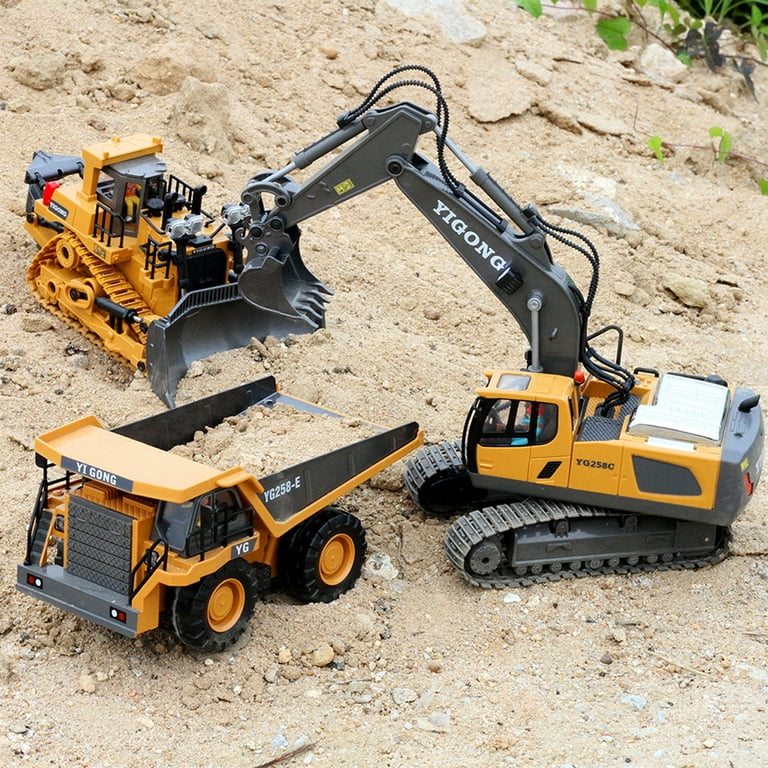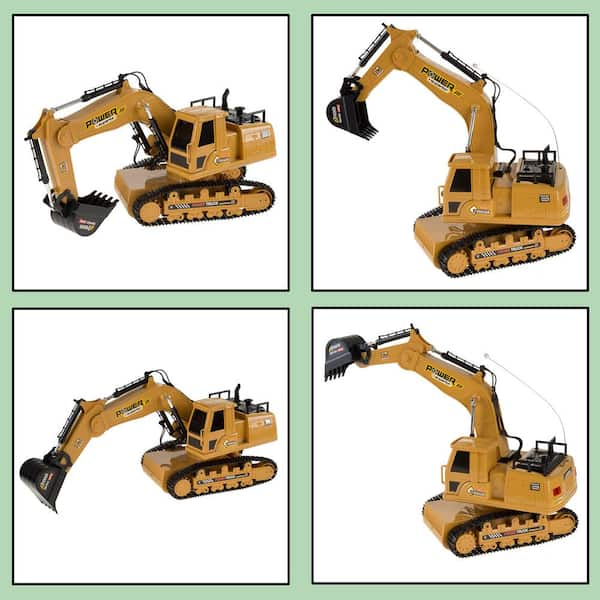Key Tips for Maximizing Efficiency with a rc excavator
Discover the Relevance of Excavator in Modern Building Projects
Excavators are necessary tools in modern construction jobs. Their convenience permits them to perform a large array of tasks, from excavating and grading to demolition and site preparation. Advanced features, such as hydraulic accessories and GPS, improve their capabilities and efficiency on work sites. As the market advances, the importance of excavators expands much more. Comprehending their function can disclose insights into the future of construction methods. What lies in advance for these equipments?
The Flexibility of Excavators in Different Projects
Excavators are commonly connected with large building and construction jobs, their convenience enables them to be made use of in a wide variety of applications, from domestic landscaping to utility maintenance. In urban setups, excavators can browse limited areas to dig foundations for homes or mount drain systems. Their ability to carry out delicate tasks makes them ideal for landscaping jobs, where they can excavate for fish ponds or plant trees. Additionally, excavators play a necessary duty in energy maintenance, successfully excavating trenches for pipes or cable televisions without interfering with surrounding areas. In farming applications, they help in land clearing and soil prep work. In addition, their flexibility enables them to be outfitted with numerous add-ons, boosting their functionality throughout various tasks. This complex nature of excavators not only improves various building procedures but also demonstrates their integral function in modern-day facilities growth and maintenance.
Secret Features and Kinds of Excavators
The discussion on crucial attributes and sorts of excavators highlights the crucial qualities that make these machines vital in construction. Various excavator types, each created for specific tasks, demonstrate their convenience and efficiency throughout various applications. rc excavator. Understanding these functions and classifications is essential for enhancing their usage in contemporary building and construction tasks
Excavator Enters Overview
Excavators play a pivotal role in modern-day building, offering adaptability and effectiveness throughout various tasks. These heavy equipment devices come in a number of kinds, each customized for certain applications. One of the most usual kinds consist of spider excavators, understood for their security on unequal surface, and wheeled excavators, which offer higher movement on paved surface areas. Tiny excavators are favored for small projects and tight areas, while long-reach excavators are created for deep digging. In addition, there are specialized excavators, such as hydraulic excavators, which enhance power and precision. Each type includes distinct abilities, making them crucial for jobs varying from excavating and grading to demolition and material handling. Comprehending these variations allows building specialists to select the ideal excavator for their task needs.
Trick Features Explained
Understanding the vital functions of excavators improves their efficient application in building projects. Excavators are characterized by their powerful hydraulic systems, which give the required force for digging, lifting, and relocating products. Their expressed arms permit a vast array of motion, facilitating specific operations in confined spaces. In addition, the variety of accessories, such as containers, grapples, and augers, broadens their convenience to fulfill various task requirements. The dimension and weight of excavators also add to their stability and maneuverability on different surfaces. Advancements in modern technology have led to the combination of GPS and automation, enhancing precision and effectiveness in excavation jobs. These functions jointly position excavators as vital devices in contemporary building.
Applications in Building and construction
Changing building and construction websites, excavators play an essential role across different applications, varying from household structure projects to massive facilities growths. These flexible equipments are equipped for tasks such as digging foundations, trenching for energies, and site grading. Various kinds of excavators, including crawler, rolled, and mini excavators, provide certain benefits customized to the task needs. Spider excavators master rough terrains, while rolled excavators offer mobility on paved surface areas. Miniature excavators are excellent for constrained rooms, making them popular in urban setups. The efficiency and power of excavators considerably speed up construction procedures, ensuring prompt project completion. Their adaptability additionally improves their relevance, enabling construction teams to tackle a diverse selection of challenges successfully.
Enhancing Efficiency and Efficiency on Task Sites
Taking full advantage of effectiveness and productivity on task sites is a crucial objective in contemporary building and construction. Excavators play a pivotal duty in achieving this objective by improving different tasks. Their ability to execute several functions-- such as training, grading, and digging-- minimizes the demand for additional devices, thereby conserving time and resources.Moreover, excavators boost workflow by enabling faster completion of jobs. With sophisticated functions like hydraulic attachments and GPS innovation, they can implement specific procedures that decrease errors and revamp. This accuracy not only boosts the quality of job but likewise optimizes product usage, adding to cost savings.The versatility of excavators enables them to adjust to different website navigate to this website problems, guaranteeing that tasks advance efficiently no matter of difficulties. By incorporating excavators into building procedures, groups can considerably enhance their general productivity, resulting in timely job completion and boosted profitability.
Security Benefits of Making Use Of Excavators
Excavators considerably enhance safety and security on building websites via boosted driver exposure and reduced hands-on labor risks. By supplying drivers with a clear sight of their surroundings, excavators assist to protect against crashes and injuries. In addition, the machinery minimizes the requirement for workers to involve in harmful manual jobs, even more promoting a more secure workplace.
Enhanced Driver Presence
Building websites can be chaotic and filled with potential hazards, boosted operator visibility plays a vital function in guaranteeing safety and security when using excavators. Modern excavators are made with large, unblocked windows and purposefully positioned mirrors, allowing operators to preserve a clear sight of their surroundings (rc excavator). This boosted presence is essential for identifying pedestrians, other equipment, and different obstacles, considerably lowering the danger of accidents. In addition, numerous excavators incorporate sophisticated modern technology, such as cams and sensing units, to give operators with additional point of views, additionally enhancing awareness. The capacity to see even more clearly not only help in efficient operation yet also fosters a more secure workplace, making it less complicated for drivers to browse intricate construction websites without jeopardizing safety and security standards
Lowered Manual Work Threats
When hands-on labor is reduced through using excavators, countless security advantages emerge, substantially improving the health of building and construction workers. Excavators reduce the physical stress connected with hefty lifting and repetitive tasks, successfully lowering the risk of musculoskeletal injuries. By automating procedures such as digging, grading, and moving products, they allow workers to keep a more secure distance from potential risks. Furthermore, excavators are furnished with sophisticated security functions, such as rollover protection systems and enhanced driver functional designs, which better safeguard employees on site. The result is a considerable reduction in office mishaps and injuries, causing raised efficiency and morale amongst building teams. Inevitably, the fostering of excavators adds to a safer and extra reliable building and construction setting.
Excavators in Earthmoving and Site Prep Work
In contemporary construction, a substantial portion of earthmoving and website preparation tasks counts on the effectiveness and adaptability of excavators. These machines are created to deal with various dirt go right here types and terrain, making them essential for rating, digging, and trenching activities. Their hydraulic arms can be outfitted with various add-ons, such as augers and buckets, allowing operators to tailor their technique based on particular task requirements.Excavators stand out at moving huge volumes of earth swiftly and successfully, which accelerates the general building timeline. They can browse limited areas and challenging websites where conventional tools may battle, improving productivity. Additionally, the accuracy of excavators assurances that website prep work complies with strict specifications, lessening the danger of mistakes that might lead to expensive rework.
The Duty of Excavators in Demolition Tasks
Excavators play a crucial role in demolition jobs, as they possess the power and dexterity needed to take down structures effectively. Equipped with various attachments such as hydraulic breakers, shears, and grapples, these makers can adjust to various demolition requirements, whether for small buildings or large industrial websites. Their adaptability makes it possible for operators to deal with intricate projects while keeping safety and click for more info precision.In enhancement to their demolition capacities, excavators help with debris removal, making sure that job sites remain orderly and safe. By damaging down frameworks into convenient pieces, they enable structured cleaning and recycling of products, lining up with contemporary sustainability efforts.Moreover, excavators can access limited rooms and browse uneven terrain, making them important in urban demolition jobs. Overall, their durable style and multifunctionality make excavators an important property in the demolition stage of building and construction, adding substantially to project timelines and effectiveness.


Future Trends in Excavator Technology and Use
As the construction market progresses, developments in excavator technology are positioned to change their usage and efficiency substantially. One substantial fad is the combination of automation and expert system, permitting excavators to run with minimal human intervention. This change will certainly boost accuracy in jobs such as grading and trenching, reducing human mistake and boosting productivity.Additionally, the surge of electric and hybrid excavators is shaping an extra sustainable building setting, lowering carbon exhausts and fuel prices. Boosted telematics systems are additionally emerging, making it possible for real-time surveillance of equipment performance and maintenance demands, which can lead to far better operational performance and longer tools lifespan.Moreover, innovations in attachment modern technology are broadening the convenience of excavators, permitting them to do a more comprehensive variety of tasks. The mix of these trends shows a future where excavators are smarter, greener, and extra adaptable, inevitably reshaping building task dynamics.
Regularly Asked Inquiries
Just How Do Excavators Compare to Other Building And Construction Equipment?
Excavators, characterized by their flexibility and power, excel in digging and earthmoving compared to various other machinery. Their capability to do various tasks, consisting of training and demolition, makes them vital in construction jobs, improving general effectiveness.

What Is the Ordinary Life-span of an Excavator?
The typical life expectancy of an excavator normally ranges from 7,000 to 10,000 operating hours, depending on maintenance, usage problems, and model. Proper care can expand this lifespan, making sure peak performance throughout its operational years.
Just How Are Excavators Kept for Optimal Efficiency?
Excavators require regular maintenance for peak efficiency, consisting of regular examinations, fluid checks, filter substitutes, and timely repairs. Implementing a preventive maintenance schedule helps prolong their life-span and warranties efficient operation in various building and construction settings.
What Are the Prices Linked With Renting Out vs. Purchasing an Excavator?
The prices connected with getting an excavator versus renting vary substantially. Leasing offers lower upfront costs but can build up gradually, while acquiring calls for a significant first financial investment, yet provides long-term savings and property possession benefits.
What Training Is Required to Run an Excavator?
Operating an excavator calls for specialized training, usually including safety methods, device procedure strategies, and environmental recognition. Qualification programs frequently mandate useful experience, making it possible for operators to deal with different tasks successfully while making certain conformity with industry guidelines. The most common types include crawler excavators, understood for their stability on irregular surface, and wheeled excavators, which offer better wheelchair on smooth surface areas. Miniature excavators are favored for tight rooms and small tasks, while long-reach excavators are developed for deep digging. In addition, there are specialized excavators, such as hydraulic excavators, which enhance power and precision. Various types of excavators, including crawler, rolled, and mini excavators, give details benefits tailored to the project demands. Crawler excavators succeed in rough terrains, while rolled excavators supply flexibility on paved surfaces.